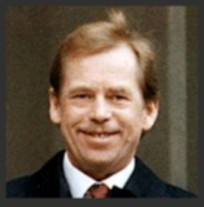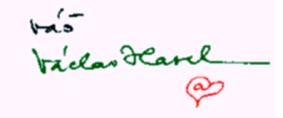|
"In this postmodern world, cultural conflicts are becoming
Václava Havla Czechoslovakia's foremost political dissident and human rights activist,
|
Václav Havel was born in October 5, 1936; Prague, Czechoslovakia. His father was a wealthy businessman; the family home was full of culture and intellectual activity. When a Moscow-backed coup took over Czechoslovakia in 1948, the Havel family was declared a "class enemy" and their property confiscated. Havel was not allowed automatic school promotion above the elementary grades. He finished high school at night by working days as a laboratory technician. His applications to liberal arts colleges were rejected, so Havel studied economics at the Czech University of Technology. After his graduation in 1957, he served two years in the army.
Havel became interested in drama, and began a regimental theater company while in the military. He found work as a stagehand in a Prague theater company in 1959 and turned to playwriting while becoming involved in the reforms of 1968, when it seemed the country would liberalize and throw off its Soviet shackles. Afterward, the Soviet-dominated, hard-line Communist government banned Havel's plays, repeatedly arrested him and jailed him twice. The only job he was allowed was as a brewery laborer, loading barrels of beer. The regime arrested Havel in 1975 after he wrote an open letter to President Gustav Husak describing Czechoslovakia as lacking real life. Along with hundreds of Czech artists and intellectuals in 1977 he helped orchestrate and produce Charter 77, the statement of resistance to Soviet occupation and communist ideology, a document dedicated to ensuring that Czech citizens were afforded basic human rights. But Havel was arrested before Charter 77 was dispersed, and in 1978 he was tried, convicted and sentenced to 4½ years in prison for involvement with a group called the Committee for the Defense of the Unjustly Persecuted. Havel was sentenced to four years of hard labor. During his prison term, authorities distorted one of Havel's letters to make it appear he had betrayed the Charter 77 movement. In the waning days of the Communist government in 1989, Havel was sentenced again for leading antigovernment demonstrations.
As a playwright, Havel's works communicate an existential philosophy, and their timing reflects the circumstances of his life. In the long period of heightened repression that followed the Soviet invasion, Havel turned to writing underground press "samizdat" works. His plays were performed in secret.
The Communist regime collapsed in Czechoslovakia in 1989, and Havel was elected president. He brought American rock musician Frank Zappa to Czechoslovakia and gave him a position in the ministry of culture. Havel addressed the U.S. Congress, telling the assembly the best way it could help Czechoslovakia was to promote democracy in Russia. One of the most compelling was his February 1990 address to the U.S. Congress on the subject of democratic ideals and the rebirth of the human spirit. The previous bipolarity of the Cold War has yielded to "an era of multipolarity in which all of us, large and small, former slaves and former masters, will be able to create what your great President Lincoln called 'the family of men."
Havel was re-elected president in 1990, presiding over the new Czechoslovakian parliament. Unfortunately, Czechoslovakia's days were numbered. The elimination of the Soviet system also meant the elimination of the adhesive that bound the disparate ethnic groups of Eastern Europe. In 1992, Czechoslovakia split into Slovakia and the Czech Republic. Havel resigned to show his disapproval, but the new Czech Republic elected him president for a five-year term.
Vaclav Havel is popular both nationally and internationally, but in the Czech Republic the prime minister wields true political power. Havel serves mainly as a moral and ethical force in the country's politics. He holds large sway over public opinion and is one of the most-recognized leaders in Europe. He also serves as an inspiration to fighters for democracy, symbolizing the power of one person to change the course of history through non-violent means.
Havel's first wife, Olga Havlova, died of cancer in January 1996. It was during his second stay in prison that he wrote the letters to her that were subsequently published as "Letters to Olga". Havel himself has been treated for cancer. Half of his right lung and a small malignant tumor have to removed in December 1996. In 1997 he married Dagmar Veskrnova.
For his literary work and civic activities, especially as a human rights champion, Vaclav Havel was awarded numerous prestigious international prizes.
· The Erasmus Prize (1986),
· The Olof Palme Prize (1989),
· The Simon Bolivar Prize,
· UNESCO (1990),
· The UNESCO Prize for the Teaching of Human Rights (1990),
· The Chalemagne Prize (1991),
· The Sonning Prize (1991),
· Theodor Heuss Prize (1993),
· Grand Cross of the Order of the Legion of Honor (1990).

